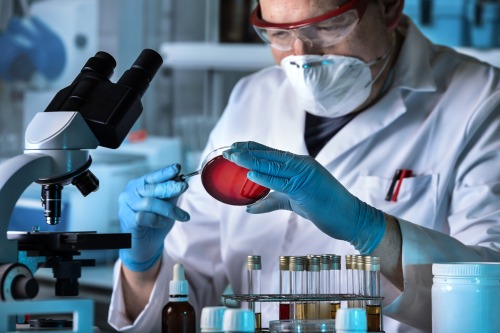
Antibiotics underpin modern medicine— used to treat everything from bacterial infections to cancer.
However, a world without effective antibiotics because of antimicrobial resistance (AMR) could mean the unraveling of health care. It also has implications for national security as antibiotics could be a first line of defense in a bioterrorism event.
At this year’s G7 meeting in the United Kingdom, finance ministers released a statement calling antimicrobial resistance a “silent pandemic.”
Currently 700,000 people die each year globally from drug-resistant diseases, but that number could jump to 10 million deaths annually by 2050, according to the United Nations. The U.S. population uses more antibiotics than any other population worldwide. More than 2.8 million antibiotic-resistant infections occur annually in the United States, and at least 35,000 people die as a result.
Now a bipartisan group of legislators — U.S. Sens. Michael Bennet (D-CO) and Todd Young (R-IN) and Reps. Mike Doyle (D-PA) and Drew Ferguson (R-GA) – are reintroducing the “The Pioneering Antimicrobial Subscriptions To End Up surging Resistance Act of 2021”, otherwise known as The PASTEUR Act, S. 2076/H.R. 3932, to promote innovation in the antibiotic development space as well as ensure the domestic supply of novel antibiotics.
“After witnessing the COVID-19 pandemic, it has never been more clear that we need to invest in research to prepare for the next public health crisis,” said Bennet in a written statement. “Infectious disease experts are already sounding alarms, and they need resources to prepare for the threat that antimicrobial resistance infections pose. With our bipartisan PASTEUR Act, we have the chance to not only learn from the mistakes we have made up to this point, but to invest in tools to better prepare for the future.”
The PASTEUR Act Would:
- Form a Committee on Critical Need Antimicrobials, consisting of representatives from relevant federal agencies, as well as doctors, patients, and outside experts, to develop and implement necessary guidance regarding infections of concern, and the favored characteristics of potential treatments.
- Establish a subscription model to encourage innovative antimicrobial drug development aimed at treating drug-resistant infections. This model will be delinked, meaning that participating developers would not receive income, as a part of their subscription payments, based on volume or quantity of sales. The model would offer antibiotic developers an upfront payment in exchange for access to their antibiotics, encouraging innovation and ensuring our health care system is prepared to treat resistant infections.
- Terms and conditions of the subscription contracts would include product availability to individuals on a government health insurance plan, supporting appropriate use, and completion of post market studies. These contracts could be valuated between $750 million and $3 billion.
- Build on existing frameworks to improve appropriate use through the CDC National Healthcare Safety Network and other programs to collect and report on antibiotic use and resistance data.
- Include transition measures such as smaller subscription contracts to support novel antimicrobial drug developers that need a financial lifeline, according to a brief released by the creators of the legislation.
“In March 2015, the U.S. National Action Plan for Combating Antibiotic-Resistant Bacteria directed federal agencies to accelerate a coordinated, full government response to antibiotic resistance and take action to expand the ability of our health care system to prevent, identify, and respond to the infection pandemic threat posed by antimicrobial resistance,” according to a release issued by the congressmen.
Wes Kim, senior officer at the Pew Charitable Trusts Antibiotic Resistance Project, said the PASTEUR Act builds on that, aiming to correct market challenges affecting the production of new antibiotics to combat resistant strains of bacteria.
“Large pharma companies have exited the [development] space because they want to pursue more attractive return on investment in other therapeutic areas,” Kim said. “[The PASTEUR Act] is not going to solve the issue but it’s going to be a huge piece of the puzzle.”
Antibiotics do not have the financial appeal of other drugs. It takes essentially five to seven days of treatment to fight off or prevent infection. From a monetary standpoint, pharmaceutical companies have greater incentive to develop drugs for chronic diseases where revenue is high.
In 2019 two companies producing novel antibiotics went bankrupt.
To avoid this, the federal government can offer financial incentive “push” mechanisms, such as U.S. National Institutes of Health or Department of Defense grants as seed money for development. In addition, “pull” mechanisms would address additional costs to enter the market, such as the expense of phase IV clinical trials, Kim said.
A Pew analysis found that 95 percent of drugs in the antibiotic clinical pipeline are being developed by small companies and that only a few large pharmaceutical companies have continued research and development.
“If we don’t get a handle on this, and we don’t address the market collapse soon, it’s not going to be a pretty picture,” Kim said.
During the COVID-19 pandemic, Pew also conducted one of the largest studies to date of antibiotic use in hospitalized COVID-19 patients, gathering data from nearly 5,000 patients and 6,000 hospital admissions.
According to the study:
“In 96% of admissions for patients diagnosed with COVID-19 in which an antibiotic was prescribed, the patient received the first antibiotic at admission or within the first 48 hours of hospitalization. It typically takes at least 48 hours to confirm a bacterial infection, so it appears that physicians frequently prescribed antibiotics empirically, i.e., before confirmation of a known bacterial infection.”
Beyond market forces, the PASTEUR Act also aims to educate health care providers on preventing antibiotic overuse, avoiding the rise of nearly impossible to treat superbugs.

